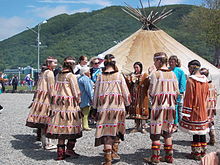Itelmens
Итәмән Ительмены | |
|---|---|
 An Itelmen dance group, 2013 | |
| Total population | |
| 3,211 | |
| Regions with significant populations | |
| 3,193[1] | |
| 18[2] | |
| Languages | |
| Itelmen, Russian | |
| Religion | |
| Polytheism, Shamanism, Russian Orthodoxy | |
| Related ethnic groups | |
| Chukchi, Koryaks | |
| |
This article may have too many red links. |
The Itelmens (Itelmen: Итәнмән, Russian: Ительмены) are a native population of the Kamchatka Peninsula in Russia. Itelmen call themselves itenme'n-itelmen, which means "an inhabitant of dry land", or "a human being."[1] They are also called Kamchadal. They are related to the Chukchi and Koryak peoples.[2]
Language[change | change source]
Itelmen spoke the Itelmen language. It is a Chukotsko-Kamchatsky language.[3] As of 2016, there are only about 5 native speakers of the language alive, and it is an endangered language.[4] Most Itelmen now speak Russian. There have been efforts to bring the language back since the 1980s.[4]
Pre-contact life[change | change source]
Kamchadal is the general term for the native peoples of Kamchatka Krai. This includes the Itelmen. Itelmen were called Kamchadals by Russian settlers until 1927.[5] They were fishermen and fur hunters. They were also herbalists, which means they used plants like herbs as medicine.[1]
Russian contact[change | change source]
Itelmens were being converted to Christians as early as the 1730s.[6]
The population of the native peoples of Kamchatka declined from 1769-1770. There were hundreds of Itelmen settlements in the 18th century, but there were only seven Itelmen-speaking villages by the 20th century.[6] Russian became the main language, and Russians spread diseases to the Itelmen, like smallpox. They also suffered from famine.[7]
Kamchadal people suffered from Russian rule. Cossacks kept Itelmen as slaves.[8] Some Itelmen who fought against the Russians were deported, or had their tribes separated.[1]
Related pages[change | change source]
References[change | change source]
- ↑ 1.0 1.1 1.2 "The Red Book of the Peoples of the Russian Empire: Itelmens". www.eki.ee. Retrieved 1 March 2022.
- ↑ "Itelmen". www.britannica.com. Retrieved 28 February 2022.
- ↑ "Itelmen". www.encyclopedia.com. Retrieved 28 February 2022.
- ↑ 4.0 4.1 Degai, Tatiana S. (2016). ""ITƏNMƏN"-- "The One Who Exists": Sociolinguistic Life of the Itelmen in Kamchatka, Russia in the Context of Language Loss and Language Revitalization". repository.arizona.edu. Retrieved 2022-03-01.
- ↑ Murashko, Olga (1997). "Itelmens and Kamchadals: Marriage Patterns and Ethnic History". Arctic Anthropology. 34 (1): 181–193. ISSN 0066-6939. JSTOR 40316432.
- ↑ 6.0 6.1 Koester, David (2005). "Global Movements and Local Historical Events: Itelmens of Kamchatka Appeal to the United Nations". American Ethnologist. 32 (4): 642–659. doi:10.1525/ae.2005.32.4.642. ISSN 0094-0496. JSTOR 3805353.
- ↑ Murashko, Olga; Krupnik, Igor I.; Davis, Eugenia W. (1994). "A Demographic History of the Kamchadal/Itelmen of Kamchatka Peninsula: Modeling the Precontact Numbers and Postcontact Depopulation". Arctic Anthropology. 31 (2): 16–30. ISSN 0066-6939. JSTOR 40316361.
- ↑ Steller, Georg Wilhelm; Falk, Marvin W (2003). Steller's history of Kamchatka: collected information concerning the history of Kamchatka, its peoples, their manners, names, lifestyle, and various customary practices. University of Alaska Press. ISBN 978-1-889963-49-5. OCLC 49844675.
